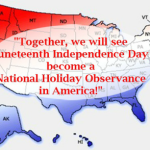
Juneteenth-June 19, 1865, the oldest African American celebration in the U.S. is considered the date when the last enslaved Blacks in America were freed, almost two and a half years after President Abraham Lincoln signed the Emancipation Proclamation.
When General George Granger rode into Galveston, Texas, one can imagine the joy in the hearts of our enslaved ancestors. The record tells us when they heard the news of freedom, they alternately sang, danced and prayed. There was much rejoicing and jubilation that their life long prayers had finally been answered.
Many of the enslaved left their masters immediately upon being freed, in search of family members, economic opportunities or simply because they could. They left with nothing but the clothes on their backs and hope in their hearts. Oh, freedom!
I hope we can appreciate the first Juneteenth celebration because Blacks were emerging from a long dark night. There was this great promise that for the first time since they had been in this land, the U.S. constitution would protect them. Blacks had optimism for the future. They were looking forward to becoming U.S. citizens.
Few realized slavery’s bitter legacy was just beginning to unfold and that equality was to remain an elusive dream. Oh, freedom!
Ex-slaves entered freedom under the worst possible conditions. Most were turned loose penniless and homeless. Ex-slaves were, as Frederick Douglass said “free, without roofs to cover them, or bread to eat, or land to cultivate, and as a consequence died in such numbers as to awaken the hope of their enemies that they would soon disappear.” They were freed without an economic base to make emancipation real.

The sharecropping system that emerged in Texas and all over the Deep South kept many blacks from starving, but had little to distinguish it from the slave life Blacks thought they had escaped. This was the other side of emancipation, where high expectations gave way to heart-crushing disillusionment.
Juneteenth teaches us that we must never forget the sacrifices of those who came before us-millions of our ancestors whose ribs became ladders for us to climb into the positions that we occupy today. While racism is a constant reminder of the legacy of slavery, Juneteenth also reminds us that lessons of perseverance, faith, cooperation and survival should never be forgotten.
Perhaps the national dialogue around this Juneteenth’s celebration will lead to change so that someday we can heal the wounds of our troubled past. Oh, freedom!